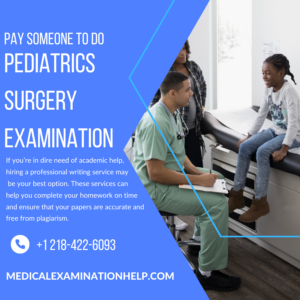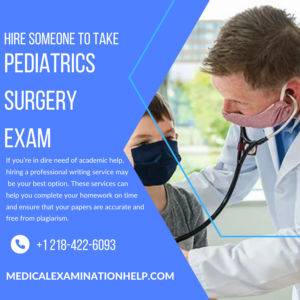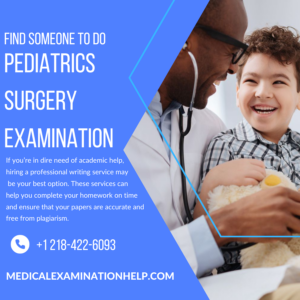
 Pediatricians are medical doctors who specialize in the healthcare maintenance, developmental monitoring and treatment of children up to age 18. They are specially trained to understand the unique health needs of children.
Pediatricians are medical doctors who specialize in the healthcare maintenance, developmental monitoring and treatment of children up to age 18. They are specially trained to understand the unique health needs of children.
Children who are having surgery may wake up confused and Pay Someone To Take Medical disoriented after waking up from anesthesia. This is normal. Make sure to bring a few toys and comfort items from home.
The pediatric surgeon is a super-specialist, and their expertise in the field of medicine is invaluable to patients. Unfortunately, their real value is often not recognized by society and remuneration for this career is very low. The career of a pediatric surgeon requires extensive training and years of work. They spend about 8 years in med school and residencies before they start making money.
The USMLE Step 2 CK (clinical knowledge) or COMLEX Level 2 CE (clinical exam) is the second hurdle that all medical students including future pediatricians must overcome. This examination is more geared towards clinical sciences and usually taken at the end of the third year or beginning of the fourth year. During this time, Surgery In Pediatrics students must prepare for the exam which may take up to four weeks of studying.
Pediatric surgeons work in a variety of medical institutions including children’s hospitals, university medical centers and large community hospitals. They perform a wide range of procedures and surgical care including:
They also treat serious injuries such as burns, lacerations and gunshot wounds. They provide non-surgical care such as wound care, bandage application and cast removal. They also diagnose and treat tumors of the chest, abdomen, skin/fat, testicles, and ovaries.
You will receive a phone call from the facility your child is scheduled for a few days prior to their surgery/procedure giving you a check in time and eating/drinking guidelines. You will need to follow these guidelines as they are important for your child’s safety. It is very important that your child’s stomach be empty when they are given anesthesia. If anything is in their stomach they may vomit and aspirate into their lungs, History Of Spinal Injuries which could lead to serious problems. The NPO (nothing by mouth) guidelines are for this reason.
Medical science is a broad field, which requires students to master several subjects and skills. These skills include analyzing medical cases, conducting research, presenting findings, diagnosing patients, and proposing treatment plans. As such, writing assignments in medical science is a challenging task. Fortunately, there are services that provide expert guidance and support in medical science assignment writing.
Unlike other writing services, these services do not employ freelance writers. They offer a wide range of academic services, including helping students write effective presentations and posters for medical-related events and conferences. They also help students improve their writing skills and explain complex medical concepts.
Additionally, these services offer customized and affordable pricing. They also ensure that the final submission meets the highest academic standards. Moreover, Anomalies Of Lymphatic System they provide round-the-clock customer support and live chat services. This helps students to communicate with the experts quickly and efficiently. Moreover, they can ask the experts to change any part of the assignment, if required.
During your child’s pre-op evaluation, the pediatric surgeon will discuss the surgical options. It’s important that the doctor is able to establish a good rapport with the child, the parents and guardians. This can be done through skilled communication and visual aids, such as freehand drawings or diagrams.
The goal of APSA is to ensure that patients in need receive the best care and treatment available from board-certified pediatric surgeons. To achieve this goal, APSA promotes excellence in clinical practice and education, encourages research and scientific progress, Anomalies Of Integumentary System and speaks with a common voice on socioeconomic policy development that affects children.
During the pre-op visit, doctors will review your child’s medical history and perform a physical examination. It’s a good idea to bring a list of any past surgeries, hospitalizations and current medications to this appointment. The doctors will also ask about any special instructions, such as NPO (nothing by mouth) guidelines before surgery. This will help prevent your child from vomiting during the anesthesia.
 Pediatric surgeons specialize in caring for infants, children, and adolescents with surgical illness. They can be found in a variety of medical institutions including children’s hospitals and Peripheral Nervous System university medical centers.
Pediatric surgeons specialize in caring for infants, children, and adolescents with surgical illness. They can be found in a variety of medical institutions including children’s hospitals and Peripheral Nervous System university medical centers.
The recent increase in failure rates on the ABS Pediatric Surgery Qualifying and Certifying Examination has brought attention to the need for continued evaluation of our training programs. This workforce blueprint will require deliberate study and strategic reform.
If your child is having surgery involving the kidneys or bladder, a preoperative urinalysis and urine culture may be needed 7-10 days prior to surgery. This will be indicated in the surgery paperwork from Pediatric Surgical Associates. If this is not completed on time, the surgery could be canceled.
It is important that your child not eat or drink anything at least 12 hours before surgery. This is to prevent stomach contents from coming up into the lungs when under anesthesia and Anomalies of Central Nervous System causing serious complications. The facility where your child is having surgery will call you a few days before the procedure with check-in information. You should arrive at the check-in time to get your child ready for surgery.
PSB supports the 2019 Pediatric Surgical Summit statement, “Right Child, Right Surgeon,” which highlights the importance of ensuring that every child has access to an appropriately trained and resourced pediatric surgeon. The current distribution of pediatric surgery subspecialists in large referral centers is unsustainable and limits broad access to care for children, especially in rural and underserved communities.
Pediatric surgeons have extensive and unique training and expertise in caring for patients with surgical disorders of children. They use equipment and facilities designed specifically for the needs of children, as well as the intricacies involved in examining and treating these patients. They also have a particular understanding of how to communicate with families, which is important because children may be nervous or unable to express their concerns during a medical examination.
Pediatric surgery as a specialty was established around the world in the 1990s, and since then, comprehensive training systems have been developed to ensure competency. However, the recent increase in the failure rate of the ABS Pediatric Surgery Qualifying and Certifying exams has prompted renewed attention to the overall quality of fellowship training in our discipline.
PSB has been working with our partners at the ACGME, RC and APSTPD to explore options for the enhancement of residency training in our discipline. We are committed to the goals of “Right Child, Anomalies of Head And Neck Right Surgeon” and to ensuring that all children have access to appropriate and timely care by board-certified pediatric surgeons.
A pediatric surgeon is a medical doctor who specializes in the diagnosis and treatment of diseases, trauma, and malformations that occur in children. They are usually trained as general surgeons and then receive additional training in the unique complexities of pediatric surgery. Often, pediatric surgeons are consulted by parents who have concerns about their child’s physical or emotional well-being.
Leaders of the nascent specialty recognized that their acceptance by the broader medical and History Of Congenital Malformations surgical community depended on proving two things to the gatekeepers at the ABS:
First, they would have to demonstrate that pediatric surgery had a discipline of its own independent of the broader disciplines of medicine and surgery. Second, they had to prove that their members were fully dedicated to the practice of pediatric surgery. This could be done by having a journal that promoted peer reviewed scholarship and by speaking with one voice on socioeconomic issues affecting the field. The establishment of these principles became the foundation for the APSA.
 Pediatric surgeons specialize in the surgical care of children. They are trained to examine and treat children in a way that makes them feel safe and comfortable. They understand the unique and Congenital Lower Extremity sometimes rare problems that affect children.
Pediatric surgeons specialize in the surgical care of children. They are trained to examine and treat children in a way that makes them feel safe and comfortable. They understand the unique and Congenital Lower Extremity sometimes rare problems that affect children.
The EBPS examination has gained international acceptance and serves as the only worldwide universal benchmark for pediatric surgical competency. The impact of the EBPS examination on career progression has been assessed using a validated questionnaire.
A recent increase in Pediatric Surgery Certifying Exam failure rates prompted the PSB to recognize that there is a problem. A key factor may be that many experienced pediatric surgeons are not accumulating enough case volumes. Regardless of the reason, this is an important issue and should be addressed by both APSA and the PSB.
The solution to this issue lies deeper than training program requirements and case volume. The core of the issue is that sub-specialization is often undertaken at the wrong time and that there is no efficient pathway for pediatric surgeons to expand their skills. This is particularly a concern for the most rural and Reactions To Medications underserved areas of the United States. The PSB encourages a community effort that will address these issues. This includes engaging our surgical and anesthesia counterparts in a similar gap analysis of their workforce. APSA has already begun this work with the launch of ExPERT.
A pediatric surgeon’s job is to treat children and adolescents with a variety of injuries and illnesses. This includes traumatic injuries such as burns and liver lacerations, and musculoskeletal problems such as hernias and bone tumors. They also perform surgical procedures for cancers of the abdomen, lungs, skin/fat, genital organs and testicles. In addition, they have extensive experience in minimally invasive surgery, which typically results in shorter hospital stays and faster recoveries.
They must be able to communicate effectively with their young patients and their parents. This can involve explaining complex topics in a way that is easy to understand. For example, History Of Infectious Disorders it is important to be able to explain embryology in layperson’s terms when discussing congenital lesions and defects with parents of a child with a genetic condition.
A key challenge is providing access to quality pediatric surgical care in rural and underserved areas. This is a core issue that affects the entire specialty. It goes beyond training program requirements and case volume and is linked to local and national health policy, economics, and workforce distribution.
Pediatric Surgery is a distinctive surgical specialty, providing care for infants, children and young adults with medical problems. It involves the diagnosis and management of complex injuries and diseases of the gastrointestinal tract, skin, chest, abdomen, testicles and genitals, as well as certain congenital conditions. Its development is linked to the evolution of general surgery as a discipline in the early 20th century.
Performing surgery on children is a unique challenge for any doctor, but it is even more complicated for a surgeon who specializes in pediatrics. They must communicate with their patients through language that is appropriate for their age and be able to explain the nature of the problem. In addition, Surgery For Congenital Anomalies they must also be aware of the impact of the condition on the family’s psychological and emotional status.
To help address these challenges, APSA launched an online resource called “Pediatric Surgery NaT,” which stands for Not a Textbook. The goal of the resource is to provide current information on general pediatric surgery. It contains everything from presentation to procedures to long-term outcomes. Physicians can use this resource to enhance their clinical skills and earn CME credits.
Pediatric surgeons have unique training and expertise in treating the wide range of surgical illnesses that affect children. They are also familiar with the unique challenges that may arise during an examination of a child, including the need to build rapport and trust with them as well as their parents or guardians. This requires skilled communication and education. It can be helpful to use freehand drawings or diagrams to help the patient understand what is being examined and to dispel any fears.
Whether you are preparing for the ABS exam or simply looking for high-quality CME, the Pediatric Surgery NaT is a great resource for both practicing and in-training pediatric surgeons. This tool includes practice-based learning objectives, images and videos, History Of Dermatologic Disorders MOC CME and the medical literature. Try it out with this 12-question test on Wilms tumor.
While sub-specialization can lead to improved outcomes, it should not come at the expense of broad access to care in rural and underserved communities. We must strive for a balance between the benefits of specialization and ensuring that pediatric surgeons can provide comprehensive services to all patients.